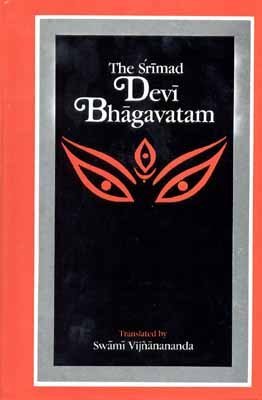The Devi Bhagavata Purana
by Swami Vijñanananda | 1921 | 545,801 words | ISBN-10: 8121505917 | ISBN-13: 9788121505918
The English translation of the Devi Bhagavata Purana. This Sanskrit work describes the Devi (Divine), the Goddess, as the foundation of the world and as identical with Brahman, the Supreme Being. The Devi Bhagavata Purana is one of the most important works in Shaktism, a branch of Hinduism focusing on the veneration of the divine feminine, along w...
Chapter 8 - On the origin of Manu
1. Saunaka said :-- “O Sūta! You have described the beautiful narrative of the first Manu Svāyambhuva. Now kindly describe to us the narratives of other highly energetic Deva-like Manus.”
2-3. Sūta said :-- “O Ṛṣis! The very wise Nārada, well versed in the knowledge of Śrī Devī, hearing the glorious character of the first Svāyambhuva Manu, became desirous to hear of the other Manus and asked the Eternal Nārāyaṇa :-- O Deva! Now favour me by reciting the origin and narratives of the other Manus.”
4. Nārāyaṇa said :-- O Devarṣi! I have already spoken to you everything regarding the first Manu. He had worshipped the Devī Bhagavatī, and thus he got his foeless kingdom. You know that then.
5-24 Manu had two sons of great prowess, Priyavrata and Uttānapāda. They governed their kingdoms with fame. The son of this Priyavrata, of indomitable valour, is known by the wise as the second Svārociṣa Manu. Dear to all the beings, this Svārociṣa Manu built his hermitage near the banks of the Kālindī (the Jumnā) and there making an earthen image of the Devī Bhagavatī, worshipped the Devī with devotion, subsisting on dry leaves and thus practised severe austerities. Thus he passed his twelve years in that forest; when, at last, the Devī Bhagavatī, resplendent with brilliance of the thousand Suns, became visible to him. She got very much pleased with his devotional stotrams. The Devī, the Saviour of the Devas, and Who was of good vows, granted to him the sovereignty for one Manvantara. Thus the Devī became famous by the name Tāriṇī Jagaddhātrī. O Nārada! Thus, by worshipping the Devī Tāriṇī, Svārociṣa obtained safely the foeless kingdom. Then establishing the Dharma duly, he enjoyed his kingdom with his sons; and, when the period of his manvantara expired, he went to the Heavens. Priyavrata’s son named Uttama became the third Manu. On the banks of the Ganges, be practised tapasyā and repeated the Vīja Mantra of Vāgbhava, in a solitary place for three years and became blessed with the favour of the Devī. With rapt devotion he sang hymns wholly to the Devī with his mind full; and, by Her boon, got the foeless kingdom and a continual succession of sons and grandsons. Thus, enjoying the pleasures of his kingdom and the gifts of the Yuga Dharma, got in the end, the excellent place, obtained by the best Rājarṣis. A very happy result. Priyavarata’s another son named Tāmasa became the fourth Manu. He practised austerities and repeated the Kāma Vīja Mantra, the Spiritual Password of Kāma on the southern banks of the Narmadā river and worshipped the World Mother. In the spring and in the autumn he observed the nine nightś vow ( the Navarātri) and worshipped the excellent lotus eyed Deveśī and pleased Her. On obtaining the Devī’s favour, he chanted excellent hymns to Her and made pranāms. There he enjoyed the extensive kingdom without any fear from any foe or from any other source of danger. He generated, in the womb of his wife, ten sons, all very powerful and mighty, and then he departed, to the excellent region in the Heavens.
The young brother of Tāmasa, Raivata became the Fifth Manu and practised austerities on the banks of the Kālindī (the Jumnā) and repeated the Kāma Vīja Mantra, the spiritual password of Kāma, the resort of the Sādhakas, capable to give the highest power of speech and to yield all the Siddhis, and thus he worshipped the Devī. He obtained excellent heavens, indomitable power, unhampered and capable of all success and a continual line of sons, grandsons, etc. Then the unrivalled excellent hero Raivata Manu established the several divisions of Dharma and enjoying all the worldly pleasures, went to the excellent region of Indra.
Here ends the Eighth Chapter of the Tenth Book on the origin of Manu in the Mahāpuraṇam Śri Mad Devī Bhāgavatam of 18,000 verses by Maharṣi Veda Vyāsa.
